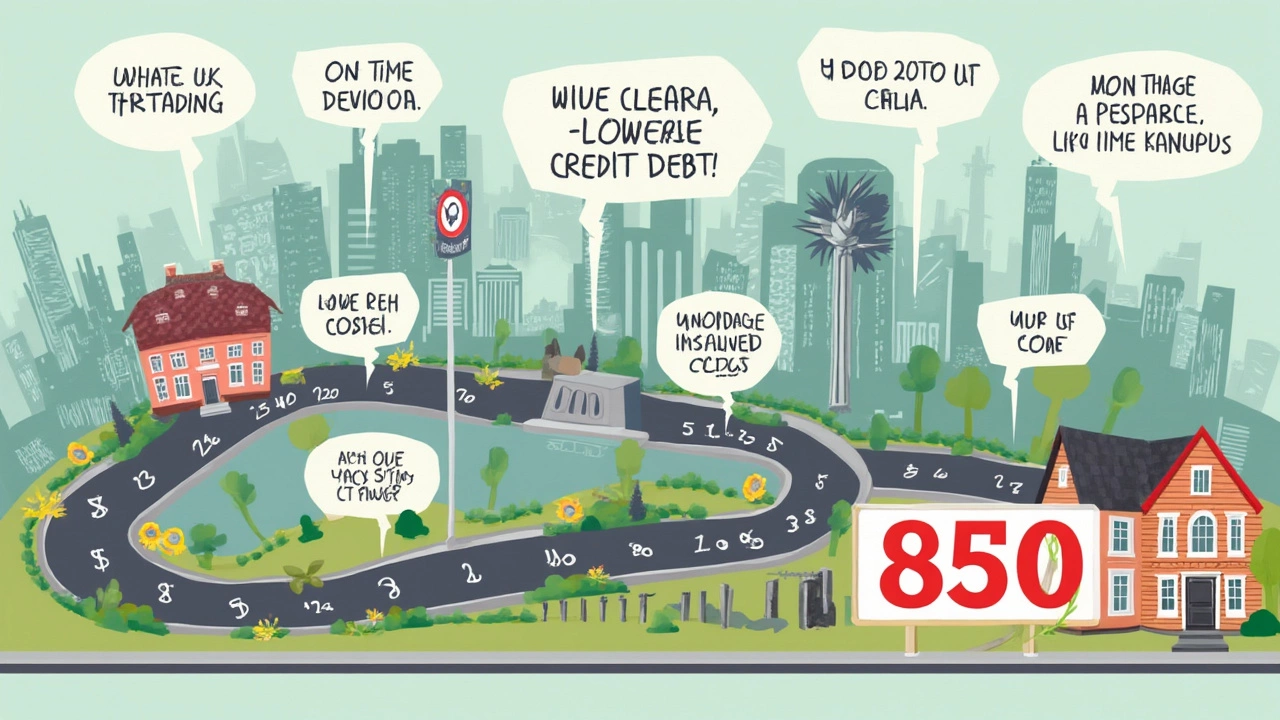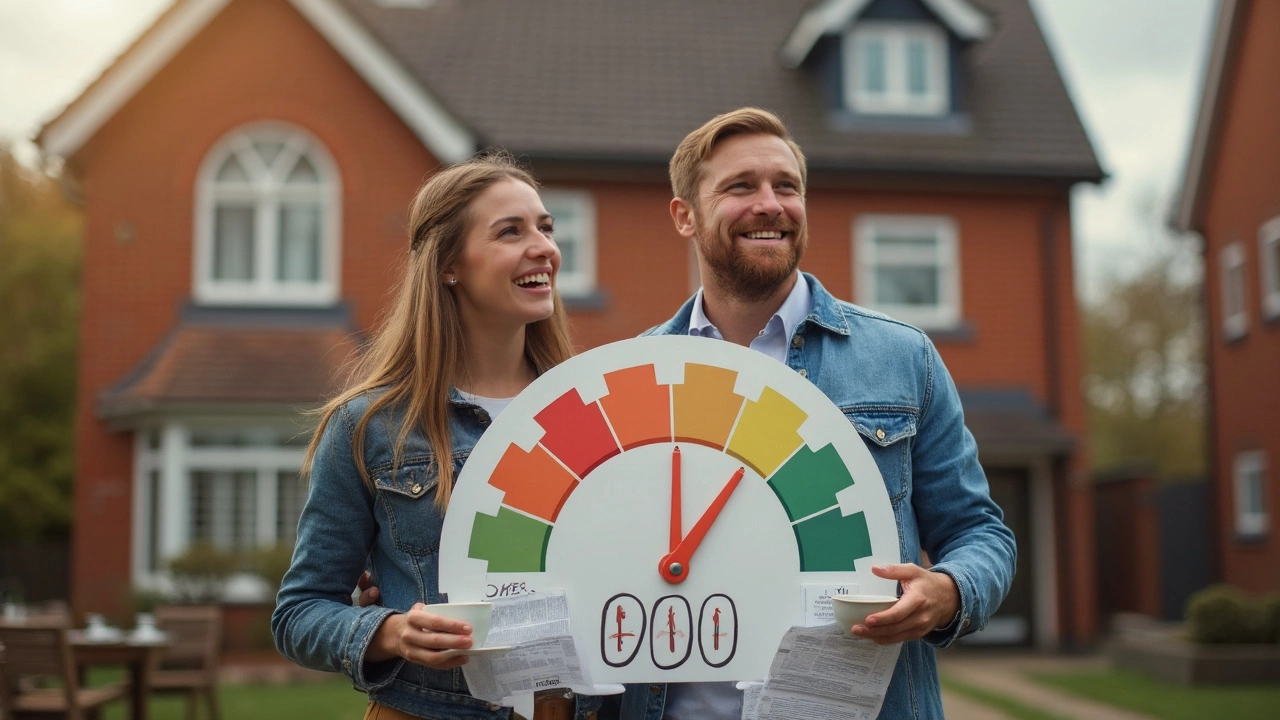Heard someone brag about having a 900 credit score? Hate to break it to you, but that's not a thing in the real world. The highest most credit scores go is 850, no matter what anyone at a dinner party might claim. And for first-time buyers, chasing a score that doesn't exist can seriously distract you from what actually helps you score a house.
Here's what matters: understanding where you stand with your credit, what score ranges actually mean for lenders, and how your credit plays into getting a solid mortgage deal. Stop stressing about magic numbers—especially ones that aren't even possible. Let's look at what you should really focus on to make homebuying less confusing and way more doable.
- The Truth About 900 Credit Scores
- How Credit Scores Work (and Their Real Limits)
- Why a Super-High Score Doesn't Guarantee a Better Home Loan
- What Lenders Really Want to See
- Practical Tips to Boost Your Credit Before Buying
The Truth About 900 Credit Scores
This might surprise you, but a 900 credit score is straight-up impossible with today’s most common credit scoring systems. The main ones you’ll hear about—FICO and VantageScore—both top out at 850. There’s literally no way you’ll see 900 on your credit report, even if you’ve never missed a payment, always kept your balances low, and have a decades-long history. If a lender or website says otherwise, they’re either confused or trying to sell you something weird.
The confusion usually starts with third-party apps or older systems that use different ranges. A few private lenders in the past played with score scales that went to 900, but none of the major U.S. lenders use them for home loans anymore. For buying a house, everything's based on the FICO or VantageScore model.
- 900 credit score? Not a thing—major systems only go up to 850.
- The average American has a FICO score around 720 as of 2024.
- Lenders don’t hand out special deals for folks above 800—after a point, you’re already in the top tier for rates and perks.
Let’s clear things up further with a quick look at today’s real credit score ranges:
| Credit Score Label | FICO Range | What It Means |
|---|---|---|
| Exceptional | 800-850 | Best rates, lowest risk |
| Very Good | 740-799 | Great rates, low risk |
| Good | 670-739 | Standard rates |
| Fair | 580-669 | Rates may be a bit higher |
| Poor | 300-579 | Hard to qualify for big loans |
So, if you’re hustling to buy a home, chasing after a mythical 900 is a waste of time. Focus on keeping your score strong in the real-world zones that lenders care about. Hitting anything over 740 usually gets you the best mortgage offers, and above 800, there’s not much extra to gain—or prove.
How Credit Scores Work (and Their Real Limits)
Credit scores honestly aren’t as mysterious as they sound. The most-used scoring systems in the U.S. are FICO and VantageScore, and both of them use a range that tops out at 850—not 900. So, no point chasing numbers you can’t actually reach.
The way your score is built isn’t a secret recipe either. It’s just math based on your financial behavior. Here’s what goes into a FICO score:
- Payment history (35%): Are you paying bills on time?
- Amounts owed (30%): How much debt do you have compared to your limits?
- Length of credit history (15%): How long have your accounts been open?
- Credit mix (10%): Do you have a mix of cards, loans, and maybe a mortgage?
- New credit (10%): How often are you applying for stuff?
It’s not about perfection. In fact, Experian said in 2024 that only about 1.5% of Americans actually hit a perfect 850. Most folks fall somewhere way below that. Here’s a quick breakdown of where people usually land:
| Score Range | Label | % of U.S. Population |
|---|---|---|
| 800-850 | Exceptional | ~23% |
| 740-799 | Very Good | ~25% |
| 670-739 | Good | ~21% |
| 580-669 | Fair | ~17% |
| 300-579 | Poor | ~14% |
The real takeaway? No lender is expecting a unicorn score. If your *900 credit score* fantasy is stressing you out, remember most banks are impressed with anything above 740. That’s the sweet spot for solid mortgage rates and the stuff that really matters when you’re buying your first place.
If you’re aiming for something realistic, focus on the basics. Pay bills on time, keep balances low, and avoid opening a bunch of new accounts just before applying for a home loan. Chasing a perfect number is way less important than showing you can handle your money.

Why a Super-High Score Doesn't Guarantee a Better Home Loan
A lot of people think if your credit score is sky-high, you'll automatically get the lowest mortgage rates and the red-carpet treatment from every lender. But that's not how it really works. Once your score hits a certain point—usually around 760—most banks just lump you into their "best rate" category. Bumping your score even closer to 850 might boost your ego, but it's not going to save you money or open new doors with lenders.
Take a look at what actually happens with mortgage rates based on your credit score. This is roughly how the brackets work when lenders look at loans (these figures are for illustration using historical averages; specific offers may vary):
| Credit Score Range | Typical 30-yr Fixed Rate (APR) |
|---|---|
| 760-850 | 6.25% |
| 700-759 | 6.47% |
| 680-699 | 6.64% |
| 620-679 | 7.13% |
See that? Once you're above 760, there's basically no difference for your mortgage rate. Lenders know you're unlikely to default if you're in that top range, so you get the best deal already. Going from 780 to 820, for example, doesn't unlock anything new. That means there's no special prize for chasing a unicorn-level number.
And here's something else: mortgage approval isn't just about your credit. Lenders also check your income, debt-to-income ratio, job stability, and how much money you've saved up for a down payment. Someone with a strong job and a solid down payment can often get the same rate as someone with a few more credit points but riskier finances. If you want an edge, focus on what you can actually improve that matters—like getting debt under control and saving a better down payment.
It's easy to obsess over numbers, but remember, even the 900 credit score doesn't exist. Aim for "excellent" credit (usually 760 or above), then shift your energy to the rest of the puzzle. That's the real move to getting approved and locking in a deal that works for you.
What Lenders Really Want to See
Getting a home loan isn’t just about chasing the 900 credit score myth. Lenders care about more than just your score, and honestly, they couldn’t care less if your score is 845 or 819. What really matters is showing you can handle debt and won’t stiff them when the bills hit.
Lenders focus on a handful of key numbers. Your credit score is only the start. Here’s what’s actually on their list:
- Credit Score: Sure, a score above 740 puts you in the "excellent" range, and you’ll snag the best rates. Anything over 800 looks great, but you won’t get extra perks for inching up from there.
- Debt-to-Income Ratio (DTI): They want to see you’re not drowning in debt. Most banks like to see your monthly debts (including your new mortgage) use less than 43% of your monthly income.
- Income Verification: Pay stubs, tax returns, and even side gig statements count. Lenders want proof you’re pulling in steady cash.
- Down Payment: The more you put down, the better. Usually, anything over 20% means less hassle and no private mortgage insurance (PMI).
- Credit History: A good mix of loans and credit cards helps, but what really counts is paying on time, every time.
Here’s a quick snapshot of typical requirements for first-time buyers:
| Factor | What Lenders Prefer |
|---|---|
| Credit Score | 740+ for best rates; 620 is usually the minimum for conventional loans |
| Debt-to-Income Ratio | 43% or lower |
| Down Payment | 20%+ is ideal, but there are options with as little as 3% down |
| Employment History | 2+ years of steady work looks best |
Lenders are mostly looking for reliability. One late payment from years ago? Not a dealbreaker if everything else checks out. But several missed payments or lots of new debt? That sets off alarms. It isn’t all about one single number—they want to see the big picture says, ‘Yep, this person’s good for it’.

Practical Tips to Boost Your Credit Before Buying
If you're thinking about buying your first house, your credit score plays a big role—way more than most people expect. You don't need a perfect number, but moving into the top range will usually save you money on interest. Here’s how to make that happen without getting lost in complicated rules.
- Check your credit reports—seriously, do it. You get a free report every year from the three big companies (Experian, Equifax, TransUnion). Look for errors like old debts showing as unpaid, or accounts that aren’t yours. A 2023 Consumer Reports study found about 34% of people found at least one mistake.
- Pay your bills on time—this isn’t news, but it’s the single biggest factor. Payment history makes up 35% of your FICO score. Even a single missed payment can drop your score by 50–100 points and haunt you for up to seven years.
- Keep your credit card balances low. Experts say you want to use less than 30% of your available credit. If you have a card with a $3,000 limit, try to keep what you owe under $900 at any given time. Lower is even better for your credit score.
- Don’t open a bunch of new accounts at once. Every application dings your score a bit, and potential lenders wonder why you suddenly need more credit.
- Consider becoming an authorized user. If a family member has great credit and trusts you, getting added to their credit card can boost your history fast—sometimes within a month or two.
Here’s some quick data to show why these tips matter. People who qualify for better mortgage rates usually have scores above 740.
| Credit Score Range | Estimated 30-year Fixed Mortgage Rate (2025) |
|---|---|
| 760-850 | 6.2% |
| 700-759 | 6.5% |
| 660-699 | 7.1% |
| 620-659 | 8.0% |
Even a jump from the high 600s into the 700s could put thousands back in your pocket over the life of your loan. Make small smart moves and you’ll see results way before you start house hunting for real.
